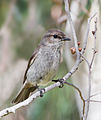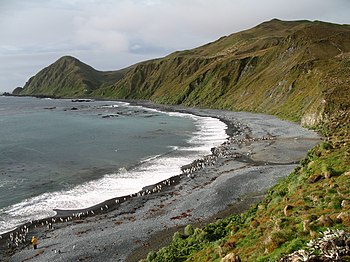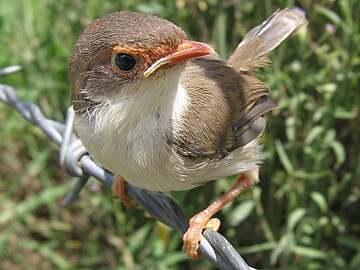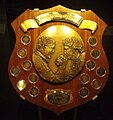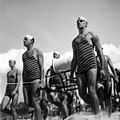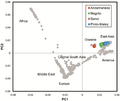Portal:Australia
| Showcase | Content | Interesting facts | Contributing |
Introduction

Australia, officially the Commonwealth of Australia, is a country comprising the mainland of the Australian continent, the island of Tasmania and numerous smaller islands. Australia has a total area of 7,688,287 km2 (2,968,464 sq mi), making it the sixth-largest country in the world and the largest country by area in Oceania. It is the world's oldest, flattest, and driest inhabited continent, with some of the least fertile soils. It is a megadiverse country, and its size gives it a wide variety of landscapes and climates including deserts in the interior and tropical rainforests along the coast.
The ancestors of Aboriginal Australians began arriving from south-east Asia 50,000 to 65,000 years ago, during the last glacial period. By the time of British settlement, Aboriginal Australians spoke 250 distinct languages and had the oldest living culture in the world. Australia's written history commenced with Dutch exploration of most of the coastline in the 17th-century. British colonisation began in 1788 with the establishment of the penal colony of New South Wales. By the mid-19th century, most of the continent had been explored by European settlers and five additional self-governing British colonies were established, each gaining responsible government by 1890. The colonies federated in 1901, forming the Commonwealth of Australia. This continued a process of increasing autonomy from the United Kingdom, highlighted by the Statute of Westminster Adoption Act 1942, and culminating in the Australia Acts of 1986.
Australia is a federal parliamentary democracy and constitutional monarchy comprising six states and ten territories. Its population of more than 28 million is highly urbanised and heavily concentrated on the eastern seaboard. Canberra is the nation's capital, while its most populous cities are Sydney and Melbourne, both with a population of more than 5 million. Australia's culture is diverse, and the country has one of the highest foreign-born populations in the world. It has a highly developed market economy and one of the highest per capita incomes globally. Its abundant natural resources and well-developed international trade relations are crucial to the country's economy. It ranks highly for quality of life, health, education, economic freedom, civil liberties and political rights.
Featured article -
The Australian Air Corps (AAC) was a temporary formation of the Australian military that existed in the period between the disbandment of the Australian Flying Corps (AFC) of World War I and the establishment of the Royal Australian Air Force (RAAF) in March 1921. Raised in January 1920, the AAC was commanded by Major William Anderson, a former AFC pilot. Many of the AAC's members were also from the AFC and would go on to join the RAAF. Although part of the Australian Army, for most of its existence the AAC was overseen by a board of senior officers that included members of the Royal Australian Navy. (Full article...)
Selected biography -
Sidney Charles Bartholemew "Ben" Gascoigne AO (11 November 1915 – 25 March 2010) was a New Zealand-born optical astronomer and expert in photometry who played a leading role in the design and commissioning of Australia's largest optical telescope, the Anglo-Australian Telescope, which for a time was one of the world's most important astronomical facilities. Born in Napier, New Zealand, Gascoigne trained in Auckland and at the University of Bristol, before moving to Australia during World War II to work at the Commonwealth Solar Observatory at Mount Stromlo in Canberra. He became skillful in the design and manufacture of optical devices such as telescope elements. (Full article...)
Did you know (auto-generated) -
- ... that Mabel Freer was deported from Australia because she could not speak Italian?
- ... that "The Potato King of Colorado" survived a shipwreck, mined for gold in Australia, and helped establish an alcohol-free Methodist colony?
- ... that the government of Victoria, Australia, has a program to remove 110 level crossings by 2030, the fastest rate in the state's history?
- ... that Australia's most threatened butterfly is confined to a native range of less than 10 square kilometres (3.9 sq mi)?
- ... that the Bluey special "The Sign" reminded a Sydney Morning Herald reporter of Australia's housing crisis?
- ... that Australian official Jack Emanuel was awarded the George Cross in 1971 after being stabbed to death whilst trying to resolve a land dispute with the Tolai people of New Guinea?
- ... that Episode 2351 of the Australian soap opera Home and Away was filmed in England, marking the first time the serial was filmed overseas?
- ... that George Jenkins was described in 1901 as "the happiest, proudest, most important and most worried individual" in Australia, but 90 years later as "a lazy, dictatorial, unctuous opportunist"?
In the news
- 30 September 2024 – Australia–Tuvalu relations, Climate change in Tuvalu
- Tuvalu's climate minister denounces the Australian Labor government's decision to expand three coal mines as an existential threat to the nation, due to the role of the mines in causing rising sea levels that have forced mass displacement across Tuvalu's low-lying islands. (The Guardian)
- 28 September 2024 – 2024 AFL premiership season
- The Brisbane Lions defeat the Sydney Swans 120–60 in the Australian Football League Grand Final to win their fourth AFL premiership title. (The Guardian Australia)
- 26 September 2024 – Israel–Hezbollah conflict
- Israel rejects proposals from the United States, Australia, and the European Union to initiate a temporary 21-day ceasefire with Hezbollah. (Reuters) (Reuters 2)
- 23 September 2024 – 2024 AFL season
- In Australian football, Patrick Cripps wins his second Brownlow Medal with 45 votes, the most votes since the current voting system was introduced, and also becomes the seventeenth player to win the award more than once. (ABC News Australia)
Selected pictures -
On this day
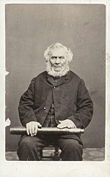
- 1800 – First copper coins circulated in New South Wales.
- 1813 – George William Evans, assistant surveyor, sets out to confirm the earlier discoveries of Blaxland, Lawson and Wentworth.
- 1834 – The first permanent European settlement on the north coast of Bass Strait is established at Portland.
- 1937 – Hubert Opperman completes an epic bicycle ride from Fremantle, Western Australia to Sydney, taking 13 days, 10 hours and 11 minutes.
- 1941 – The cruiser HMAS Sydney is involved in a mutually destructive battle with the German ship Kormoran off Western Australia. All 645 aboard Sydney die.
- 1996 – US President Bill Clinton makes a visit to Australia in which he addresses both Houses of Parliament.
- 1996 – Martin Bryant is sentenced to 35 consecutive sentences of life imprisonment plus 1035 years without parole for the Port Arthur massacre.
General images
Topics
More portals
WikiProject
 |
 |
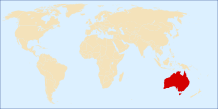
| |
Consider joining WikiProject Australia, a WikiProject dedicated to improving Wikipedia's coverage of topics related to Australia. The project page and its subpages contain suggestions on formatting and style of articles, which can be discussed at the project's notice board. To participate, simply add your name to the project members page.
As of 18 November 2024, there are 205,567 articles within the scope of WikiProject Australia, of which 594 are featured and 885 are good articles. This makes up 2.97% of the articles on Wikipedia, 5.34% of all featured articles and lists, and 2.18% of all good articles (see WP:AUSFG). Including non-article pages, such as talk pages, redirects, categories, etc., there are 526,360 pages in the project.
Associated Wikimedia
The following Wikimedia Foundation sister projects provide more on this subject:
-
Commons
Free media repository -
Wikibooks
Free textbooks and manuals -
Wikidata
Free knowledge base -
Wikinews
Free-content news -
Wikiquote
Collection of quotations -
Wikisource
Free-content library -
Wikiversity
Free learning tools -
Wikivoyage
Free travel guide -
Wiktionary
Dictionary and thesaurus







